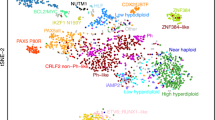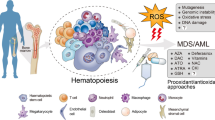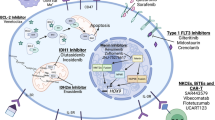Abstract
The myelodysplastic syndromes (MDS) pose a unique diagnostic challenge for clinicians and pathologists due to the clinicopathologic heterogeneity of the disease and overlapping features with other benign and malignant disorders. Currently, the initial evaluation of a patient with suspected MDS centers around a detailed medical history, review of the peripheral blood and bone marrow by an expert hematopathologist and risk stratification using laboratory results, morphology and cytogenetics. More sophisticated technologies, including multi-color flow cytometry, fluorescence in-situ hybridization (FISH), next-generation sequencing, and others are emerging and promise to offer significant refinements in diagnostic, prognostic and, hopefully, therapeutic information. With the incidence and prevalence of MDS increasing worldwide, it is critical for clinicians to optimize the initial evaluation of a patient with suspected disease, using a standard schema, to facilitate accurate diagnosis, risk stratification and treatment.

Similar content being viewed by others
References
Papers of particular interest, published recently, have been highlighted as: • Of major importance
Issa JP. The myelodysplastic syndrome as a prototypical epigenetic disease. Blood. 2013;121(19):3811–7. doi:10.1182/blood-2013-02-451757.
Pang WW, Pluvinage JV, Price EA, Sridhar K, Arber DA, Greenberg PL, et al. Hematopoietic stem cell and progenitor cell mechanisms in myelodysplastic syndromes. Proc Natl Acad Sci U S A. 2013;110(8):3011–6. doi:10.1073/pnas.1222861110.
Greenberg PL. The multifaceted nature of myelodysplastic syndromes: clinical, molecular, and biological prognostic features. J Natl Compr Canc Netw. 2013;11(7):877–85.
Howlader NNA, Krapcho M, Garshell J, Neyman N, Altekruse SF, Kosary CL, et al., editors. SEER cancer statistics review, 1975–2010: section 30 Myelodysplastic Syndromes (MDS), Chronic Myeloproliferative Disorders (CMD), and Chronic Myelomonocytic Leukemia (CMML). Bethesda: National Cancer Institute; 2013. http://seer.cancer.gov/csr/1975_2010/. Accessed August 15, 2013 2013.
Sekeres MA. Epidemiology, natural history, and practice patterns of patients with myelodysplastic syndromes in 2010. J Natl Compr Canc Netw. 2011;9(1):57–63.
• Greenberg PL, Attar E, Bennett JM, Bloomfield CD, Borate U, De Castro CM, et al. Myelodysplastic syndromes. J Natl Compr Canc Netw. 2013;11(7):838–74. Current NCCN guidelines for the diagnosis and treatment of MDS provide detailed recommendations and the standards of care based on updated data, with am extensive list of references.
Pellagatti A, Cazzola M, Giagounidis A, Perry J, Malcovati L, Della Porta MG, et al. Deregulated gene expression pathways in myelodysplastic syndrome hematopoietic stem cells. Leukemia. 2010;24(4):756–64. doi:10.1038/leu.2010.31.
Naqvi K, Garcia-Manero G, Sardesai S, Oh J, Vigil CE, Pierce S, et al. Association of comorbidities with overall survival in myelodysplastic syndrome: development of a prognostic model. J Clin Oncol. 2011;29(16):2240–6. doi:10.1200/JCO.2010.31.3353.
Bennett JM, Catovsky D, Daniel MT, Flandrin G, Galton DA, Gralnick HR, et al. Proposals for the classification of the myelodysplastic syndromes. Br J Haematol. 1982;51(2):189–99.
Swerdlow S, Campo E, Harris NL, Jaff ES, Pileri SA, Stein H, et al. WHO classification of tumours of haematopoietic and lymphoid tissues. 4th ed. Lyon: IARC Press; 2008.
• Vardiman JW, Thiele J, Arber DA, Brunning RD, Borowitz MJ, Porwit A, et al. The 2008 revision of the World Health Organization (WHO) classification of myeloid neoplasms and acute leukemia: rationale and important changes. Blood. 2009;114(5):937–51. doi:10.1182/blood-2009-03-209262. The updated 2008 pathologic classification of hematopoietic malignancies is an essential reference and integrates clinical and pathology data.
Valent P, Horny HP, Bennett JM, Fonatsch C, Germing U, Greenberg P, et al. Definitions and standards in the diagnosis and treatment of the myelodysplastic syndromes: Consensus statements and report from a working conference. Leuk Res. 2007;31(6):727–36. doi:10.1016/j.leukres.2006.11.009.
Valent P, Bain BJ, Bennett JM, Wimazal F, Sperr WR, Mufti G, et al. Idiopathic cytopenia of undetermined significance (ICUS) and idiopathic dysplasia of uncertain significance (IDUS), and their distinction from low risk MDS. Leuk Res. 2012;36(1):1–5. doi:10.1016/j.leukres.2011.08.016.
Schanz J, Tuchler H, Sole F, Mallo M, Luno E, Cervera J, et al. New comprehensive cytogenetic scoring system for primary myelodysplastic syndromes (MDS) and oligoblastic acute myeloid leukemia after MDS derived from an international database merge. J Clin Oncol. 2012;30(8):820–9. doi:10.1200/JCO.2011.35.6394.
• Afable 2nd MG, Wlodarski M, Makishima H, Shaik M, Sekeres MA, Tiu RV, et al. SNP array-based karyotyping: differences and similarities between aplastic anemia and hypocellular myelodysplastic syndromes. Blood. 2011;117(25):6876–84. doi:10.1182/blood-2010-11-314393. The most recent and comprehensive analysis of cytogenetics in MDS serves as the basis for the IPSS-R.
Mohamedali AM, Alkhatabi H, Kulasekararaj A, Shinde S, Mian S, Malik F, et al. Utility of peripheral blood for cytogenetic and mutation analysis in myelodysplastic syndrome. Blood. 2013;122(4):567–70. doi:10.1182/blood-2012-12-471847.
Tiu RV, Gondek LP, O’Keefe CL, Elson P, Huh J, Mohamedali A, et al. Prognostic impact of SNP array karyotyping in myelodysplastic syndromes and related myeloid malignancies. Blood. 2011;117(17):4552–60. doi:10.1182/blood-2010-07-295857.
Thiel A, Beier M, Ingenhag D, Servan K, Hein M, Moeller V, et al. Comprehensive array CGH of normal karyotype myelodysplastic syndromes reveals hidden recurrent and individual genomic copy number alterations with prognostic relevance. Leukemia. 2011;25(3):387–99. doi:10.1038/leu.2010.293.
Jadersten M, Saft L, Smith A, Kulasekararaj A, Pomplun S, Gohring G, et al. TP53 mutations in low-risk myelodysplastic syndromes with del(5q) predict disease progression. J Clin Oncol. 2011;29(15):1971–9. doi:10.1200/JCO.2010.31.8576.
Padron E, Komrokji R, List AF. The 5q- syndrome: biology and treatment. Curr Treat Options Oncol. 2011;12(4):354–68. doi:10.1007/s11864-011-0165-1.
Graubert TA, Payton MA, Shao J, Walgren RA, Monahan RS, Frater JL, et al. Integrated genomic analysis implicates haploinsufficiency of multiple chromosome 5q31.2 genes in de novo myelodysplastic syndromes pathogenesis. PloS one. 2009;4(2):e4583.
Heinrichs S, Kulkarni RV, Bueso-Ramos CE, Levine RL, Loh ML, Li C, et al. Accurate detection of uniparental disomy and microdeletions by SNP array analysis in myelodysplastic syndromes with normal cytogenetics. Leukemia. 2009;23(9):1605–13. doi:10.1038/leu.2009.82.
Hussain FT, Nguyen EP, Raza S, Knudson R, Pardanani A, Hanson CA, et al. Sole abnormalities of chromosome 7 in myeloid malignancies: spectrum, histopathologic correlates, and prognostic implications. Am J Hematol. 2012;87(7):684–6. doi:10.1002/ajh.23230.
Saumell S, Florensa L, Luno E, Sanzo C, Canizo C, Hernandez JM, et al. Prognostic value of trisomy 8 as a single anomaly and the influence of additional cytogenetic aberrations in primary myelodysplastic syndromes. Br J Haematol. 2012;159(3):311–21. doi:10.1111/bjh.12035.
Bernasconi P, Klersy C, Boni M, Cavigliano PM, Dambruoso I, Zappatore R. Validation of the new comprehensive cytogenetic scoring system (NCCSS) on 630 consecutive de novo MDS patients from a single institution. Am J Hematol. 2013;88(2):120–9. doi:10.1002/ajh.23369.
Greenberg PL, Tuechler H, Schanz J, Sanz G, Garcia-Manero G, Sole F, et al. Revised international prognostic scoring system for myelodysplastic syndromes. Blood. 2012;120(12):2454–65. doi:10.1182/blood-2012-03-420489.
• Jabbour E, Takahashi K, Wang X, Cornelison AM, Abruzzo L, Kadia T, et al. Acquisition of cytogenetic abnormalities in patients with IPSS defined lower-risk myelodysplastic syndrome is associated with poor prognosis and transformation to acute myelogenous leukemia. Am J Hematol. 2013. doi:10.1002/ajh.23513. This reference is the manuscript introducing the revised IPSS, which is expected to become the new gold standard of risk stratification in MDS.
Haferlach C, Alpermann T, Schnittger S, Kern W, Chromik J, Schmid C, et al. Prognostic value of monosomal karyotype in comparison to complex aberrant karyotype in acute myeloid leukemia: a study on 824 cases with aberrant karyotype. Blood. 2012;119(9):2122–5. doi:10.1182/blood-2011-10-385781.
Voutiadou G, Papaioannou G, Gaitatzi M, Lalayanni C, Syrigou A, Vadikoliou C, et al. Monosomal karyotype in acute myeloid leukemia defines a distinct subgroup within the adverse cytogenetic risk category. Cancer Genet. 2013;206(1–2):32–6. doi:10.1016/j.cancergen.2012.10.003.
Gangat N, Patnaik MM, Begna K, Kourelis T, Knudson RA, Ketterling RP, et al. Evaluation of revised IPSS cytogenetic risk stratification and prognostic impact of monosomal karyotype in 783 patients with primary myelodysplastic syndromes. Am J Hematol. 2013;88(8):690–3. doi:10.1002/ajh.23477.
Cluzeau T, Mounier N, Karsenti JM, Richez V, Legros L, Gastaud L, et al. Monosomal karyotype improves IPSS-R stratification in MDS and AML patients treated with Azacitidine. Am J Hematol. 2013. doi:10.1002/ajh.23509.
Patnaik MM, Hanson CA, Hodnefield JM, Knudson R, Van Dyke DL, Tefferi A. Monosomal karyotype in myelodysplastic syndromes, with or without monosomy 7 or 5, is prognostically worse than an otherwise complex karyotype. Leukemia. 2011;25(2):266–70. doi:10.1038/leu.2010.258.
Schanz J, Tuchler H, Sole F, Mallo M, Luno E, Cervera J, et al. Monosomal karyotype in MDS: explaining the poor prognosis? Leukemia. 2013. doi:10.1038/leu.2013.187.
Valcarcel D, Adema V, Sole F, Ortega M, Nomdedeu B, Sanz G, et al. Complex, not monosomal, karyotype is the cytogenetic marker of poorest prognosis in patients with primary myelodysplastic syndrome. J Clin Oncol. 2013;31(7):916–22. doi:10.1200/JCO.2012.41.6073.
Braulke F, Jung K, Schanz J, Gotze K, Muller-Thomas C, Platzbecker U, et al. Molecular cytogenetic monitoring from CD34+ peripheral blood cells in myelodysplastic syndromes: First results from a prospective multicenter German diagnostic study. Leuk Res. 2013;37(8):900–6. doi:10.1016/j.leukres.2013.03.019.
Braulke F, Jung K, Schanz J, Gotze K, Muller-Thomas C, Platzbecker U, et al. Molecular cytogenetic monitoring from CD34+ peripheral blood cells in myelodysplastic syndromes: First results from a prospective multicenter German diagnostic study. Leuk Res. 2013. doi:10.1016/j.leukres.2013.03.019.
Greenberg P, Cox C, LeBeau MM, Fenaux P, Morel P, Sanz G, et al. International scoring system for evaluating prognosis in myelodysplastic syndromes. Blood. 1997;89(6):2079–88.
Malcovati L, Germing U, Kuendgen A, Della Porta MG, Pascutto C, Invernizzi R, et al. Time-dependent prognostic scoring system for predicting survival and leukemic evolution in myelodysplastic syndromes. J Clin Oncol. 2007;25(23):3503–10. doi:10.1200/JCO.2006.08.5696.
Malcovati L, Della Porta MG, Strupp C, Ambaglio I, Kuendgen A, Nachtkamp K, et al. Impact of the degree of anemia on the outcome of patients with myelodysplastic syndrome and its integration into the WHO classification-based Prognostic Scoring System (WPSS). Haematologica. 2011;96(10):1433–40. doi:10.3324/haematol.2011.044602.
Garcia-Manero G, Shan J, Faderl S, Cortes J, Ravandi F, Borthakur G, et al. A prognostic score for patients with lower risk myelodysplastic syndrome. Leukemia. 2008;22(3):538–43. doi:10.1038/sj.leu.2405070.
Bejar R, Stevenson KE, Caughey BA, Abdel-Wahab O, Steensma DP, Galili N, et al. Validation of a prognostic model and the impact of mutations in patients with lower-risk myelodysplastic syndromes. J Clin Oncol. 2012;30(27):3376–82. doi:10.1200/JCO.2011.40.7379.
Voso MT, Fenu S, Latagliata R, Buccisano F, Piciocchi A, Aloe-Spiriti MA, et al. Revised International Prognostic Scoring System (IPSS) Predicts Survival and Leukemic Evolution of Myelodysplastic Syndromes Significantly Better Than IPSS and WHO Prognostic Scoring System: Validation by the Gruppo Romano Mielodisplasie Italian Regional Database. J Clin Oncol. 2013;31(21):2671–7. doi:10.1200/JCO.2012.48.0764.
Platzbecker U, Santini V, Mufti GJ, Haferlach C, Maciejewski JP, Park S, et al. Update on developments in the diagnosis and prognostic evaluation of patients with myelodysplastic syndromes (MDS): consensus statements and report from an expert workshop. Leuk Res. 2012;36(3):264–70. doi:10.1016/j.leukres.2011.11.005.
Adema V, Hernandez JM, Abaigar M, Lumbreras E, Such E, Calull A, et al. Application of FISH 7q in MDS patients without monosomy 7 or 7q deletion by conventional G-banding cytogenetics: does −7/7q- detection by FISH have prognostic value? Leuk Res. 2013;37(4):416–21. doi:10.1016/j.leukres.2012.12.010.
Mallo M, Arenillas L, Espinet B, Salido M, Hernandez JM, Lumbreras E, et al. Fluorescence in situ hybridization improves the detection of 5q31 deletion in myelodysplastic syndromes without cytogenetic evidence of 5q. Haematologica. 2008;93(7):1001–8. doi:10.3324/haematol.13012.
Seegmiller AC, Wasserman A, Kim AS, Kressin MK, Marx ER, Zutter MM, et al. Limited utility of fluorescence in situ hybridization for common abnormalities of myelodysplastic syndrome at first presentation and follow-up of myeloid neoplasms. Leuk Lymphoma. 2013. doi:10.3109/10428194.2013.801470.
van de Loosdrecht AA, Westers TM. Cutting edge: flow cytometry in myelodysplastic syndromes. J Natl Compr Canc Netw. 2013;11(7):892–902.
Wells DA, Benesch M, Loken MR, Vallejo C, Myerson D, Leisenring WM, et al. Myeloid and monocytic dyspoiesis as determined by flow cytometric scoring in myelodysplastic syndrome correlates with the IPSS and with outcome after hematopoietic stem cell transplantation. Blood. 2003;102(1):394–403. doi:10.1182/blood-2002-09-2768.
van de Loosdrecht AA, Ireland R, Kern W, Della Porta MG, Alhan C, Balleisen JS, et al. Rationale for the clinical application of flow cytometry in patients with myelodysplastic syndromes: position paper of an International Consortium and the European LeukemiaNet Working Group. Leuk Lymphoma. 2013;54(3):472–5. doi:10.3109/10428194.2012.718341.
Westers TM, Ireland R, Kern W, Alhan C, Balleisen JS, Bettelheim P, et al. Standardization of flow cytometry in myelodysplastic syndromes: a report from an international consortium and the European LeukemiaNet Working Group. Leukemia. 2012;26(7):1730–41. doi:10.1038/leu.2012.30.
Westers TM, van der Velden VH, Alhan C, Bekkema R, Bijkerk A, Brooimans RA, et al. Implementation of flow cytometry in the diagnostic work-up of myelodysplastic syndromes in a multicenter approach: report from the Dutch Working Party on Flow Cytometry in MDS. Leuk Res. 2012;36(4):422–30. doi:10.1016/j.leukres.2011.09.015.
Kern W, Haferlach C, Schnittger S, Haferlach T. Clinical utility of multiparameter flow cytometry in the diagnosis of 1013 patients with suspected myelodysplastic syndrome: correlation to cytomorphology, cytogenetics, and clinical data. Cancer. 2010;116(19):4549–63. doi:10.1002/cncr.25353.
Bacher U, Haferlach T, Kern W, Weiss T, Schnittger S, Haferlach C. The impact of cytomorphology, cytogenetics, molecular genetics, and immunophenotyping in a comprehensive diagnostic workup of myelodysplastic syndromes. Cancer. 2009;115(19):4524–32. doi:10.1002/cncr.24501.
Della Porta MG, Picone C, Pascutto C, Malcovati L, Tamura H, Handa H, et al. Multicenter validation of a reproducible flow cytometric score for the diagnosis of low-grade myelodysplastic syndromes: results of a European LeukemiaNET study. Haematologica. 2012;97(8):1209–17. doi:10.3324/haematol.2011.048421.
Bejar R, Levine R, Ebert BL. Unraveling the molecular pathophysiology of myelodysplastic syndromes. J Clin Oncol. 2011;29(5):504–15. doi:10.1200/JCO.2010.31.1175.
Lindsley RC, Ebert BL. Molecular pathophysiology of myelodysplastic syndromes. Annu Rev Pathol. 2013;8:21–47. doi:10.1146/annurev-pathol-011811-132436.
• Bejar R, Stevenson K, Abdel-Wahab O, Galili N, Nilsson B, Garcia-Manero G, et al. Clinical effect of point mutations in myelodysplastic syndromes. New Engl J Med. 2011;364(26):2496–506. doi:10.1056/NEJMoa1013343. This reference is an excellent review of what is currently known about the molecular pathophysiology of MDS.
Graubert TA, Shen D, Ding L, Okeyo-Owuor T, Lunn CL, Shao J, et al. Recurrent mutations in the U2AF1 splicing factor in myelodysplastic syndromes. Nat Genet. 2012;44(1):53–7. doi:10.1038/ng.1031.
Papaemmanuil E, Cazzola M, Boultwood J, Malcovati L, Vyas P, Bowen D, et al. Somatic SF3B1 mutation in myelodysplasia with ring sideroblasts. New Engl J Med. 2011;365(15):1384–95. doi:10.1056/NEJMoa1103283.
Abdel-Wahab O, Levine R. The spliceosome as an indicted conspirator in myeloid malignancies. Cancer Cell. 2011;20(4):420–3. doi:10.1016/j.ccr.2011.10.004.
Yoshida K, Sanada M, Shiraishi Y, Nowak D, Nagata Y, Yamamoto R, et al. Frequent pathway mutations of splicing machinery in myelodysplasia. Nature. 2011;478(7367):64–9. doi:10.1038/nature10496.
Compliance with Ethics Guidelines
Conflict of Interest
Danielle Marshall and Gail J. Roboz declare that they have no conflict of interest.
Human and Animal Rights and Informed Consent
This article does not contain any studies with human or animal subjects performed by any of the authors.
Author information
Authors and Affiliations
Corresponding author
Rights and permissions
About this article
Cite this article
Marshall, D., Roboz, G.J. Standardizing the Initial Evaluation for Myelodysplastic Syndromes. Curr Hematol Malig Rep 8, 361–369 (2013). https://doi.org/10.1007/s11899-013-0180-3
Published:
Issue Date:
DOI: https://doi.org/10.1007/s11899-013-0180-3




